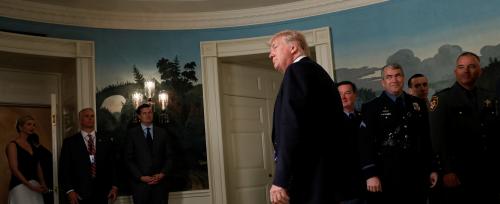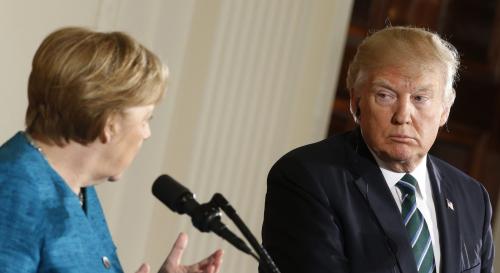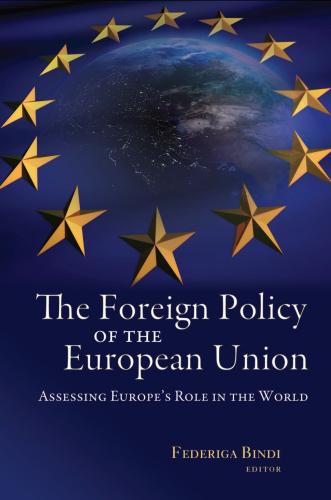The United States’ policy on Europe has become increasingly hostile towards bodies that it views as curtailing sovereignty, to the benefit of nationalist politicians in Europe, argues Constanze Stelzenmüller. This piece originally appeared in the Financial Times.
What with the recent US government shutdown, a toxic Brexit, Canadians being held hostage by China and a crisis in Venezuela, it could seem a little frivolous to call attention to America’s Europe policy. After all, Nato is still standing, the sanctions guillotine is still suspended in mid-air, as are trade tariffs against the EU. It’s all still just presidential tweets, right? Right?
Not quite. The Trump administration is haemorrhaging high-ranking policymakers focused on Europe at a rate that is alarming, even by its own dizzying turnover standards. December’s blistering resignation letter by former secretary of defence Jim Mattis, a staunch transatlanticist, sent a shudder through the ranks of America’s allies. But several key Europe and international affairs experts in his office had already left before him.
Last week, A Wess Mitchell, the top Europe hand at the State Department and another committed friend of Nato and eastern Europe, announced he was throwing in the towel after only 16 months in the job. That his last day coincides with the beginning of the Munich Security Conference, an annual transatlantic love-fest, is less than reassuring.
A few weeks before Christmas, US secretary of state Mike Pompeo gave a speech on Europe in Brussels — his first, and eagerly awaited — in which he extolled the virtues of nationalism, criticised multilateralism and the EU, and said that “international bodies” which constrain national sovereignty “must be reformed or eliminated”.
At around the same time, the status of the EU ambassador to Washington was downgraded. The unfortunate occupant of that post, David O’Sullivan, only found out when he was called last to his seat at George H W Bush’s funeral. A senior diplomat in Helsinki commented recently: “We are quite irritated” (bear in mind the Finnish flair for understatement). And that was before the US House of Representatives passed a bill intended to prevent the president from using federal funds to pull the US out of Nato by 357 votes to 22. Most of Donald Trump’s Congressional allies in the Freedom Caucus voted against.
In Berlin, meanwhile, diplomats have been poring glumly over The Virtue of Nationalism, a book by the Israeli writer Yoram Hazony, which Mr Mitchell had told them was the key to the Trump administration’s Europe policy. Mr Hazony’s book — published in 2018 to fervent applause from conservative commentators in the US — purports to provide the theoretical gloss on Mr Trump’s tweets: nationalism as the cure to “liberal imperialism”. The two main “empires” he has in mind are post-cold war, liberal-interventionist America and the EU.
Teutonic brows are furrowing presumably at passages from the book such as this: “The European Union is a German imperial state in all but name . . . Should the United States ever withdraw its protection . . . a strong European executive will be appointed by Germany.” Mr Hazony goes on to write that a “German-dominated EU” is an “imperial order”, that “will work to delegitimise and undermine the independence of all remaining national states”.
Never mind that this is spectacularly misinformed about the status of nation states in Europe or Germany’s power over them and the EU. Repress, if you can, the realisation that Mr Hazony thinks the EU could succeed where the Nazis failed. And try to ignore the question implied by both Messrs Pompeo and Hazony: to what imaginary golden age of nationalism exactly should Europe’s clock be turned back? 1989? 1945? 1918?
Most Europeans could list a litany of genuine ills afflicting governance in Europe at all levels that this cod-philosophical take misses by a mile. Mr Hazony blithely disregards the complexity and depth of economic, social and technological integration across national boundaries. And, of course, disassembling the EU would not solve the problem of German preponderance — it would exacerbate it.
But the real value of this and other prescriptions for a new divide-and-rule US policy for Europe lies in the piercing new light they throw on the Trumpian mindset. The nationalism it peddles is not the inclusive, civic kind practised by, say, Canada. On the contrary, this is an ethno-chauvinist nationalism premised on the rule of a majority nation “whose cultural dominance is plain and unquestioned, and against which resistance appears to be futile”, as Mr Hazony puts it. That is a framing entirely compatible with the thinking of Hungary’s Viktor Orban, the Kremlin or, for that matter, Germany’s far-right Alternative for Germany party.
If these are the US’s new allies in an age of cultural warfare, then Nato is indeed in danger. The security conference in Munich is sure to be interesting.










Commentary
Op-edAmerica’s policy on Europe takes a nationalist turn
January 30, 2019